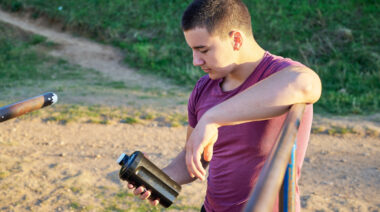It’s possible that the ergogenic effect of caffeine comes at a cost. It makes sense that improved performance means more physical stress, but when sports require repeated intense performance, this extra cost may actually become a detriment.
A new study in the Journal of the International Society of Sports Nutrition provided new insights into the potential limitations of caffeine use. The hypothesis was that carbohydrate intake coincident with caffeine intake might mitigate some of these negative effects and prolong the ergogenic benefit of caffeine when repeated sprints were required.
Intense activity creates a greater acid load in the body, which requires energy to buffer. In response to the increase in stress, cortisol levels also increase. Cortisol is a stress hormone that also has catabolic (muscle breakdown) properties. Generally, it’s best to keep cortisol levels low.
In addition to changing acid status and hormone levels, caffeine also seems to stimulate blood sugar, perhaps due to the effects on cortisol. The researchers focused on this aspect of increased caffeine and carb intake.
Study Design
Eleven female athletes performed repeated sprints on an exercise bike. The sprints were five bouts of four-second sprints, with twenty seconds of slower cycling in between. After two minutes of rest, this process was repeated for a total of ten times. This sort of repeated sprinting effort is similar to the demands of many sports.
Each of the participants did four different trials in a random order. Their blood was tested afterward, and an agility test was performed under each condition as well. Before the repeated sprint tests they consumed one of the following:
- Caffeine and carbs together
- Two placebos made to look and taste like caffeine and carbs
- Caffeine or carbs alone with the opposite placebo
Results
Oddly enough, the caffeine didn’t help at all, under any condition. The carb-only condition did improve performance, however. There was a six-percent increase in total work performed and significantly higher power in set six for the carb group. The increase went away when caffeine was added.
Blood sugar was higher in every condition except when there was no carb or caffeine ingestion. This means that the caffeine alone increased blood sugar, as predicted. Lactate was also higher under all the other conditions except placebo only.
When it came to hormones and agility, there was no difference between the groups. Testosterone and cortisol levels were both the same.
In the end, it seems that carbs alone benefited repeated sprint ability, but caffeine didn’t have the ergogenic effect it was expected to. The researchers guessed that the work was too anaerobic, resulting in the unexpected effect.
They also noted that when rest ratios are too short, caffeine has no benefit, probably because it acts primarily on aerobic metabolism. As such, their study design may not have been best for what they were looking for. All that said, if you participate in a sport requiring repeated sprint ability, stay away from caffeine in favor of carbs before your workout workout.
References:
1. Chia-Lun Lee, et. al., “Effects of carbohydrate combined with caffeine on repeated sprint cycling and agility performance in female athletes,” Journal of the International Society of Sports Nutrition, 11:17, 2014
Photo courtesy of Shutterstock.






